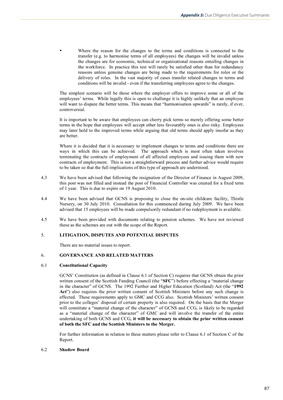
87
Appendix 5: Due Diligence Executive Summaries
• Where the reason for the changes to the terms and conditions is connected to the
transfer (e.g. to harmonise terms of all employees) the changes will be invalid unless
the changes are for economic, technical or organisational reasons entailing changes in
the workforce. In practice this test will rarely be satisfied other than for redundancy
reasons unless genuine changes are being made to the requirements for roles or the
delivery of roles. In the vast majority of cases transfer related changes to terms and
conditions will be invalid - even if the transferring employees agree to the changes.
The simplest scenario will be those where the employer offers to improve some or all of the
employees' terms. While legally this is open to challenge it is highly unlikely that an employee
will want to dispute the better terms. This means that "harmonisation upwards" is rarely, if ever,
controversial.
It is important to be aware that employees can cherry pick terms so merely offering some better
terms in the hope that employees will accept other less favourably ones is also risky. Employees
may later hold to the improved terms while arguing that old terms should apply insofar as they
are better.
Where it is decided that it is necessary to implement changes to terms and conditions there are
ways in which this can be achieved. The approach which is most often taken involves
terminating the contracts of employment of all affected employees and issuing them with new
contracts of employment. This is not a straightforward process and further advice would require
to be taken so that the full implications of this type of approach are understood.
4.3 We have been advised that following the resignation of the Director of Finance in August 2009,
this post was not filled and instead the post of Financial Controller was created for a fixed term
of 1 year. This is due to expire on 19 August 2010.
4.4 We have been advised that GCNS is proposing to close the on-site childcare facility, Thistle
Nursery, on 30 July 2010. Consultation for this commenced during July 2009. We have been
advised that 15 employees will be made compulsorily redundant if no redeployment is available.
4.5 We have been provided with documents relating to pension schemes. We have not reviewed
these as the schemes are out with the scope of the Report.
5. LITIGATION, DISPUTES AND POTENTIAL DISPUTES
There are no material issues to report.
6. GOVERNANCE AND RELATED MATTERS
6.1 Constitutional Capacity
GCNS' Constitution (as defined in Clause 6.1 of Section C) requires that GCNS obtain the prior
written consent of the Scottish Funding Council (the "SFC") before effecting a "material change
in the character" of GCNS. The 1992 Further and Higher Education (Scotland) Act (the "1992
Act") also requires the prior written consent of Scottish Ministers before any such change is
effected. These requirements apply to GMC and CCG also. Scottish Ministers' written consent
prior to the colleges' disposal of certain property is also required. On the basis that the Merger
will constitute a "material change of the character" of GCNS and CCG, is likely to be regarded
as a "material change of the character" of GMC and will involve the transfer of the entire
undertaking of both GCNS and CCG, it will be necessary to obtain the prior written consent
of both the SFC and the Scottish Ministers to the Merger.
For further information in relation to these matters please refer to Clause 6.1 of Section C of the
Report.
6.2 Shadow Board